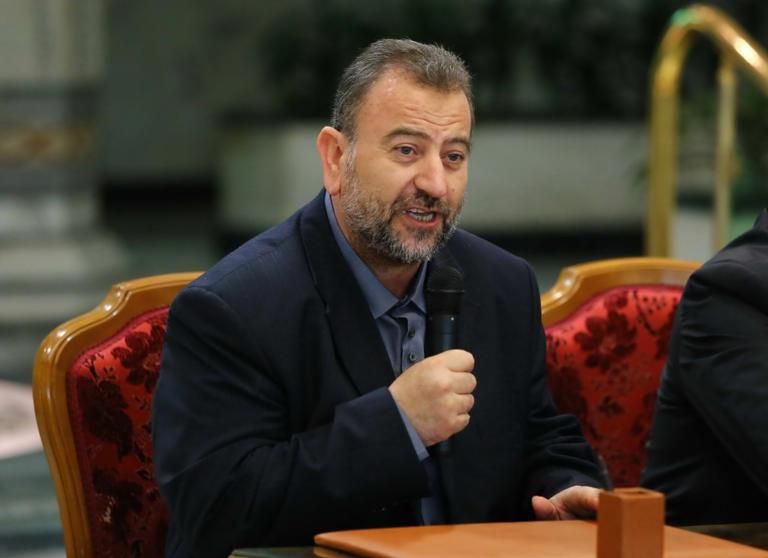
Who are the Hamas leaders exterminated by the IDF six months into the war?
Six months into Israel’s war with Hamas, Israeli forces have hunted down and killed at least 10 political leaders and senior commanders of the terrorist group in their drive to eradicate the extremist movement once and for all.
Israel Defense Forces (IDF) began searching for Hamas’ top brass within days of the group’s deadly Oct. 7, 2023 rampage, relying on its intelligence services to track down terrorist leaders hiding out in the Gaza Strip, as well as in neighboring hostile countries like Lebanon.
Israeli Defense Minister Yoav Gallant vowed, in the wake of the worst terrorist attack in Israel’s history, to “wipe this thing called Hamas, ISIS-Gaza, off the face of the earth.”
Sunday marks six months since the outbreak of the deadly conflict. In that time, more than 31,000 Palestinians have been killed, according to Gaza’s Hamas-controlled Health Ministry. On the Israeli side, 600 IDF soldiers have been killed and more than 3,100 wounded, based on the latest numbers released by the military.
And in Hamas’ surprise attack that triggered the war, 1,200 people, mainly Israeli citizens, were slaughtered and 240 others were taken captive.
Hamas’ top leader, Ismail Haniyeh, and his cohorts — Yahya Sinwar, Mohammed Deif, Khaled Meshaal and Mahmoud Zahar — remain at large to this day.
But other high-value terrorist targets have been less fortunate.
Here is what we know about them:
Murad Abu Murad, 45, the head of Hamas’ air force, was killed in an Israeli airstrike on Gaza City on Oct. 13. The Israeli military claimed Murad “took a big part in directing terrorists during the massacre” on Oct. 7.
Ali Qadhi, a commander in the Nukhba special-forces unit who the IDF said led one of the assaults against towns in southern Israel, was killed in a drone strike on Oct. 14.
Qadhi was arrested by Israel in 2005 for the kidnapping and slaughter of Israeli businessman Sasson Nuriel and sentenced to life in prison, but he had been cut loose as part of the 2011 prisoner exchange that secured the release of Israeli soldier Gilad Shalit.
Billal Al Kedra, a commander of the elite southern Khan Yunis Nukhba forces, was taken out by an airstrike in the Gaza Strip on Oct. 14. The IDF said at the time that Al Kedra, 37, was the mastermind of the massacre in Kibbutz Nirim that left dozens of Israeli civilians dead.
Osama Mazini, 57, a former senior Palestinian leader and Hamas’ one-time chief hostage negotiator, was killed in an airstrike on Oct. 16, with the Israeli air force claiming that he “directed terrorist activities against Israel.”
In his capacity as a hostage negotiator, Mazini was in charge of handling the case of Gilad Shalit during the soldier’s five years of captivity.
Ayman Nofal, 49, a senior commander in Hamas’ military wing known as the Al-Qassam Brigades, was killed in an airstrike targeting the Bureij refugee camp on Oct. 17.
Hailed by Hamas as a “martyr,” Nofal was in charge of the group’s military activities in the central Gaza Strip. The IDF described Nofal as “one of the most dominant figures in the terrorist organization” who was said to have played a key role in the planning of the abduction of Gilad Shalit in June 2006.
Ibrahim Biari, commander of Hamas’ Central Jabaliya Battalion operating out of the Jabaliya refugee camp in Gaza, was killed by IDF fighter jets on Oct. 31. The Israeli military said Biari was responsible for sending some of the terrorist units to slaughter Israelis on Oct. 7.
Biari was also said to be behind the 2004 terrorist attack in the Port of Ashdod, in which 13 innocent people were killed.
Ahmed Ghandour, commander of Hamas’ Northern Brigade for at least 18 years, was killed in an Israeli airstrike targeting an underground tunnel in Gaza on Nov. 14.
Ghandour was a member of the Al Qassam Brigades’ General Military Council and was believed to be a close associate of Hamas military bigwig Muhammad Deif. In 2017, he was labeled a “Specially Designated Global Terrorist” by the US.
Saleh Al Arouri, a deputy Hamas leader and a founding commander of its military wing, Al Qassam Brigades, died in a Jan. 2 IDF drone strike in his office in Beirut, Lebanon, where he was living at the time.
Israeli Prime Minister Benjamin Netanyahu welcomed Arouri’s demise, referring to him as Hamas’ “number four.”
“We already eliminated number four in Hamas. Three, two, and one are on the way,” he said. “They are all dead men. We will reach them all,” he said.
Arouri was seen as a key player in the Hamas movement, leading its operations in the West Bank from exile in Syria, Turkey, Qatar and finally Lebanon after prolonged stints in Israeli prisons.
Marwan Issa, 59, deputy commander of Hamas’ military wing, was killed in an Israeli airstrike on March 10 that left five people dead in the Al-Nusseirat camp.
Issa is the highest-ranking Hamas official eliminated by Israel since the war began. He was at the top of IDF’s most-wanted list together with Mohammed Deif and Yahya Sinwar, who are suspected to have orchestrated the Oct. 7 rampage.
Issa, nicknamed the “Shadow Man” for his penchant to stay out of the limelight, had been the target of several previous IDF assassination attempts, which saw his home hit three times and his sprawling vacation residence in Gaza raided by soldiers.
Hadi Mustafa, described by the Israeli military as a “significant operative” in Hamas’ unit responsible for international terrorist activities targeting Israelis and Jews, was killed by a drone strike while sitting in a car outside the city of Tyr in southern Lebanon on March 13.
Mustafa, who hailed from the Rashidieh refugee camp, had been linked to Saleh Al Arouri, Hamas’ deputy leader outside of Gaza who was taken out in January.
Source » msn.com





